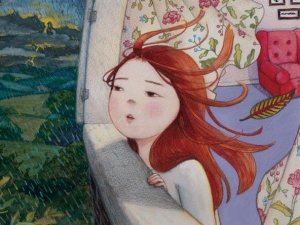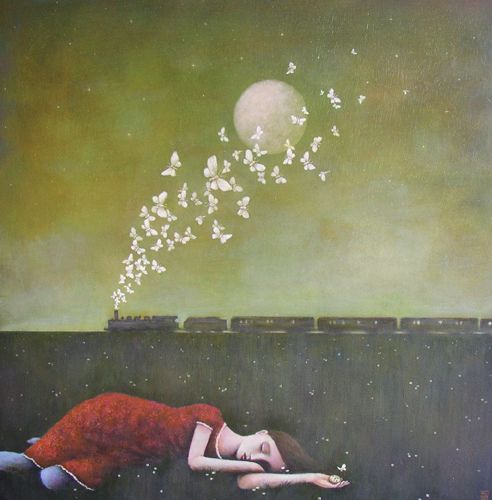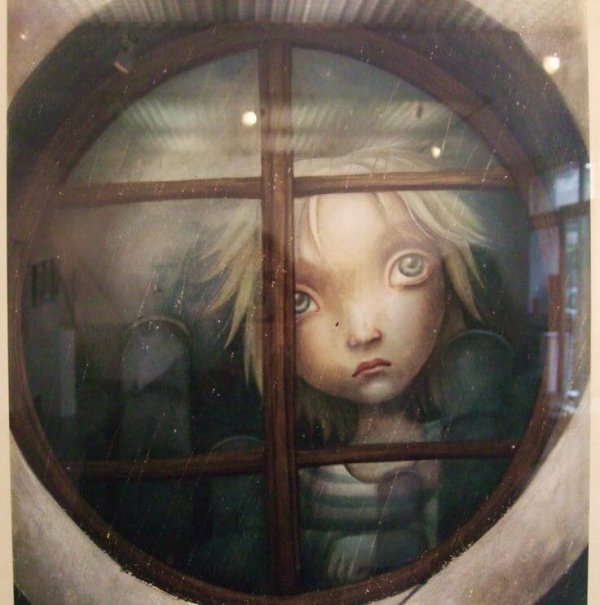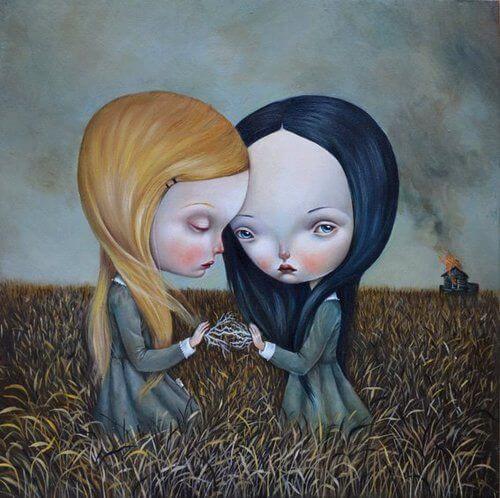The Demons from Our Childhood


Written and verified by the psychologist Gema Sánchez Cuevas
Childhood is the most important stage in life in terms of internalizing values, lessons and behaviors. Many psychologists that specialize in the study of the childhood and infant stages stress the importance of a gradual maturing and the act of overcoming different stages in a satisfactory way in order to not become stuck in any of them.
If we had to point out the people who most influenced a child, these would have to be its parents or main guardian. The majority of parents and guardians love us, want the best for us and know that raising a child is a difficult task. However, wanting is not always the same as doing.
Childhood experiences affect us in adulthood
Not all parenthood takes place within an ideal context. There may be an imbalance in the distribution of chores, a lack of emotional maturity, a crisis in the relationship itself. Or this new responsibility can simply turn out to be too much or too difficult for some people.

In this article we’re not going to judge, nor do we want anyone to think we are. But there’s no doubt, some upbringings have negatively impacted the lives of some children that today are now adults. We’re going to name some of these practices and associate them to behaviors that can emerge in adulthood. Because sometimes knowledge and introspection is the best weapon we can have against our demons.
Parental attitudes that inhibit their children during childhood
In many cases, our experiences during childhood are determining factors for our adult lives. There are a series of attitudes that some parents have towards their children that disable them from living fully in the future:
- Overprotection: Parents always want to prevent bad things from happening to their children, and they believe that inhibiting their freedom is the key. Their fear is so intense that they need to keep them controlled, in a “safe zone.” The consequences that may arise are shyness, lack of initiative, pathological doubt when beginning any individual activity and a continuous search for approval.
“Childhood has its own way of seeing, thinking and feeling. There’s nothing less wise than trying to substitute them for our own.”-Jean Jacques Rousseau-

- Projection of frustrated desires from their youth onto their children: Some parents want their children to become what they themselves were never able to, even if this may not be compatible with their children’s interests. The consequences are a lack of self-esteem, low frustration tolerance and emotional dependence.
- Lack of signs of affection: This attitude is usually the most devastating. A child needs contact with their parents. They need to receive or feel love. Otherwise, they will assume that coldness is the attitude they too should assume. The consequences will be a desperate search for love in others, and problems balancing and expressing their emotions.
“Every child comes into the world with a certain sense of love, but it’s up to the parents and friends to determine if this love growths or dies.”-Graham Greene-
- Depressive attitudes by the parent or a sense of worthlessness: To see people in their home continuously express that their life doesn’t make them happy, causes severe emotional distress in a child.
- Comparisons with other people or siblings: Some parents believe that their parenting style should be the same for all of their children, and ignore children’s individual differences. The consequences will be a sense of futility in the child, as well as a lack of confidence in their abilities and skills.

- Family strife, confrontations or divorce: All divorces are hard, but when there are children around it’s much more complicated. Many couples use “parental alienation” with their children, completely destroying their innocence and burdening them with a problem. The child will have a strong sense of abandonment and cognitive and emotional turmoil.
When the problems we experience during childhood still hurt
Although many years pass and everything you lived seems very distant and forgotten, sometimes you keep very clear memories of all of those situations that made you feel bad and you didn’t understand. Now you may understand them, but with some regret and much resignation.
A good way to get rid of that burden is to go through“emotional catharsis” with the people who lived the whole situation with you, including your parents. That is to rid yourself of everything you have inside, expressing yourself. The importance of freeing yourself from the negative, from that burden, is that it’ll help us carry a lighter load.
You can better understand the circumstances they were in by comparing them to yours. And if the time comes, don’t repeat them with your children. Because once is enough, because things can always be done better, and turning the page because is the only thing left to do.
Childhood is the most important stage in life in terms of internalizing values, lessons and behaviors. Many psychologists that specialize in the study of the childhood and infant stages stress the importance of a gradual maturing and the act of overcoming different stages in a satisfactory way in order to not become stuck in any of them.
If we had to point out the people who most influenced a child, these would have to be its parents or main guardian. The majority of parents and guardians love us, want the best for us and know that raising a child is a difficult task. However, wanting is not always the same as doing.
Childhood experiences affect us in adulthood
Not all parenthood takes place within an ideal context. There may be an imbalance in the distribution of chores, a lack of emotional maturity, a crisis in the relationship itself. Or this new responsibility can simply turn out to be too much or too difficult for some people.

In this article we’re not going to judge, nor do we want anyone to think we are. But there’s no doubt, some upbringings have negatively impacted the lives of some children that today are now adults. We’re going to name some of these practices and associate them to behaviors that can emerge in adulthood. Because sometimes knowledge and introspection is the best weapon we can have against our demons.
Parental attitudes that inhibit their children during childhood
In many cases, our experiences during childhood are determining factors for our adult lives. There are a series of attitudes that some parents have towards their children that disable them from living fully in the future:
- Overprotection: Parents always want to prevent bad things from happening to their children, and they believe that inhibiting their freedom is the key. Their fear is so intense that they need to keep them controlled, in a “safe zone.” The consequences that may arise are shyness, lack of initiative, pathological doubt when beginning any individual activity and a continuous search for approval.
“Childhood has its own way of seeing, thinking and feeling. There’s nothing less wise than trying to substitute them for our own.”-Jean Jacques Rousseau-

- Projection of frustrated desires from their youth onto their children: Some parents want their children to become what they themselves were never able to, even if this may not be compatible with their children’s interests. The consequences are a lack of self-esteem, low frustration tolerance and emotional dependence.
- Lack of signs of affection: This attitude is usually the most devastating. A child needs contact with their parents. They need to receive or feel love. Otherwise, they will assume that coldness is the attitude they too should assume. The consequences will be a desperate search for love in others, and problems balancing and expressing their emotions.
“Every child comes into the world with a certain sense of love, but it’s up to the parents and friends to determine if this love growths or dies.”-Graham Greene-
- Depressive attitudes by the parent or a sense of worthlessness: To see people in their home continuously express that their life doesn’t make them happy, causes severe emotional distress in a child.
- Comparisons with other people or siblings: Some parents believe that their parenting style should be the same for all of their children, and ignore children’s individual differences. The consequences will be a sense of futility in the child, as well as a lack of confidence in their abilities and skills.

- Family strife, confrontations or divorce: All divorces are hard, but when there are children around it’s much more complicated. Many couples use “parental alienation” with their children, completely destroying their innocence and burdening them with a problem. The child will have a strong sense of abandonment and cognitive and emotional turmoil.
When the problems we experience during childhood still hurt
Although many years pass and everything you lived seems very distant and forgotten, sometimes you keep very clear memories of all of those situations that made you feel bad and you didn’t understand. Now you may understand them, but with some regret and much resignation.
A good way to get rid of that burden is to go through“emotional catharsis” with the people who lived the whole situation with you, including your parents. That is to rid yourself of everything you have inside, expressing yourself. The importance of freeing yourself from the negative, from that burden, is that it’ll help us carry a lighter load.
You can better understand the circumstances they were in by comparing them to yours. And if the time comes, don’t repeat them with your children. Because once is enough, because things can always be done better, and turning the page because is the only thing left to do.
This text is provided for informational purposes only and does not replace consultation with a professional. If in doubt, consult your specialist.







